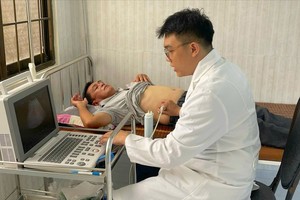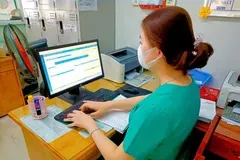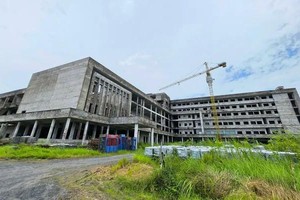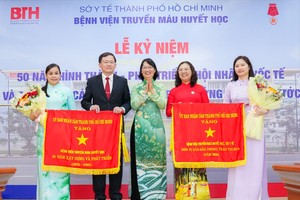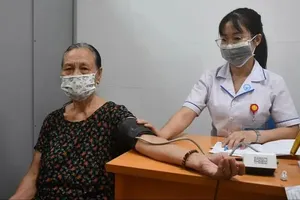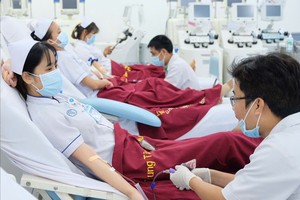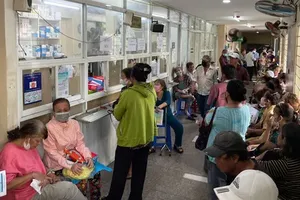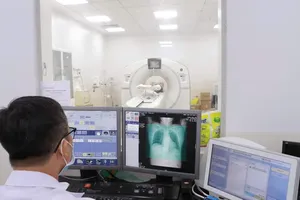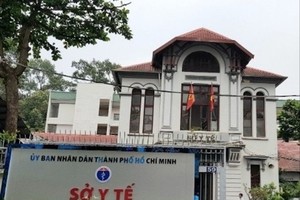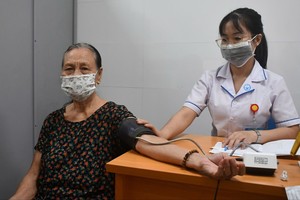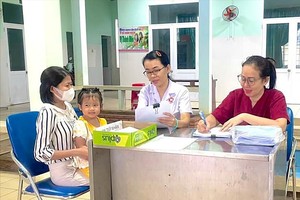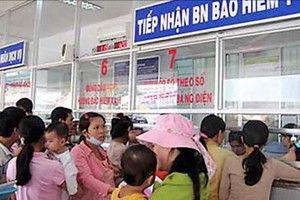 |
A panel discussion at the forum on new approaches for Pharma-Healthcare Development in Vietnam in Hanoi on July 20. — Photo baodautu.vn |
New approaches for pharma-healthcare development in Vietnam were the main topics of discussion at a forum organized in Hanoi on July 20.
At the event, held by the Dau tu (Investment Review) Newspaper, participants heard that the investment trend in the medicine and pharmacy fields changed a lot in the direction of focusing on innovation, research and development, clinical trials, and technology transfer.
Therefore, there was a need for new approaches to investment in the health and pharmaceutical sectors to attract resources and technology, and contribute to the achievement of the country's common goal of better protection, caring for, and improvement of people's health.
Delegates focused on discussing the role of Resolution No. 29-NQ/TW in 2022 that promotes the industrialisation and modernisation of the country through 2030 with a vision to 2045, and an action plan for the implementation of the Resolution for the sustainable development of the biotechnology and pharmaceutical industries in Vietnam.
In the new development phase, Resolution No.29-NQ/TW has become a guideline for many industries, including the healthcare sector. Promulgating an action plan with specific content would contribute to better supporting the sustainable development of the country’s biotechnology and pharmaceutical industries.
Deputy Minister of Planning and Investment Nguyen Thi Bich Ngoc said that, although many preferential mechanisms had been issued to attract investment in the pharmaceutical sector, the results had not yet met expectations.
“Vietnam wishes to develop the pharmaceutical industry in the direction of developing new products, brand-name drugs, and invented drugs, and to receive high technology transfer in the field of pharmaceutical production,” said Ngoc.
The development of the pharmaceutical industry had been identified as one of the central priorities of the Government of Vietnam. In that spirit, Ngoc recommended that delegates research and thoroughly discuss solutions on how Vietnam can improve its competitiveness in the supply chain of pharmaceuticals and medical services as well as receive technology transfer into the production process of drugs, vaccines, and medical-biological products.
“Recently, there have been a number of large pharmaceutical corporations in the world that want to develop a specialised industrial park for the pharmaceutical industry in Vietnam. This is a very good idea, if we form clusters and industrial parks focusing on pharmaceutical production, it will be the basis for attracting investment in developing the pharmaceutical industry and moving towards making Vietnam a regional centre for pharmaceutical production,” added Ngoc.
Pharma Group chairman Emin Turan said that attracting investment in the medical and pharmaceutical industry would bring many socio-economic benefits, and Vietnam should need to be aware of investment competition from other countries and speed up the process of attracting investment.
He suggested Vietnam focus on institutional reform to maintain and develop a viable operating environment and improve the policy environment. The improved regulatory environment would improve stability and predictability, thereby increasing the ability to attract new investment.
“Based on the strengths and experience of the pharmaceutical industry, we propose that the programme to implement the Resolution should focus on institutional reform, building a specific goal of shortening the time people have to access new drugs as well as offering a flexible health financing mechanism, ensuring the harmony of interests of the parties. At the same time, the industry development must be based on science, with a roadmap to create a healthy development ecosystem based on competition, innovation, and deep and wide integration in order to improve the competitiveness of Vietnam's pharmaceutical industry in the region and the world,” said Turan.
Do Van Su, deputy director of the Foreign Investment Agency (FIA) under the Ministry of Planning and Investment, said that despite the Vietnamese Government's prioritization of healthcare as a key sector for investment, and with substantial support and incentives for privatisation, the level of funding remained modest.
According to FIA statistics, total investment in healthcare pharmaceuticals stands at approximately US$5.5 billion, spread across 341 projects. This figure represents a mere 1.3 per cent of the total registered FDI in Vietnam. Given the size of Vietnam's economy, which caters to a population of over 100 million, this sector – a subset of the broader manufacturing industry – is notably underfunded.
Prof. Nguyen Hai Nam, rector of the Hanoi University of Pharmacy, said that domestic companies still paid insufficient attention to investing in science, technology and innovation. There was a pressing need for collaboration among various stakeholders, including the government, academic institutions, and businesses, to enhance career prospects in this field.
“From a business perspective, I believe that the introduction of more supportive tax policies could serve as a significant incentive to attract further FDI into this sector. The potential for growth and innovation in Vietnam's pharmaceutical industry is vast, but realising this potential will require a concerted effort from all parties involved. By fostering a supportive environment for both education and business, Vietnam can position itself as a significant player in the global pharmaceutical industry,” Nam added.
Editor-in-Chief of Vietnam Investment Review Le Trong Minh said that from the approach of Resolution 29/NQ-TW and with current global investment and technology trends, the health sector and manufacturing pharmaceuticals were being placed in front of new opportunities to mobilize and exploit great resources at home and abroad to quickly transit to research and development, and the modernization and sustainable development of the pharmaceutical industry in Vietnam.
“The ideas exchanged at today's forum hopefully will bring valuable reference in the process of institutionalising, concretising the guidelines and orientations from Resolution 29 in the medical and pharmaceutical industry, bringing opportunities for better access for people to advanced, high-quality medicines at a lower cost and price, suitable for the affordability of the majority of people,” said Minh.
